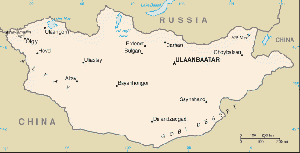Difference between revisions of "Mongolia"
| [unchecked revision] | [unchecked revision] |
GameoAdmin (talk | contribs) (CSV import - 20130816) |
GameoAdmin (talk | contribs) (CSV import - 20130820) |
||
| Line 1: | Line 1: | ||
| − | + | [[File:Mongolia-map.gif|300px|thumb|right|''Mongolia. World factbook map, 2006 | |
| − | |||
| − | |||
| − | |||
| + | '']] Mongolia is a highland on the continent of Asia, which used to belong to [[Russia|Russia]], but was shared in the 1950s by [[People's Republic of China|China]], Russia and the ex-People's Republic of Mongolia (also known as Mongolia or Mongol Uls). In Inner Mongolia, the smaller southern division of the country, the [[Krimmer Mennonite Brethren|Krimmer Mennonite Brethren]] of America opened a mission in the city of Chotzeshan (Cho-tzushan or Zhuozishan), about 250 miles (400 km) north of Peking, with several subsidiary stations. Buildings were erected for evangelization, school, and hospital. The inhabitants of the city and the district showed a wish for the Gospel and participated actively in the services. The establishment of the Communist regime in China in 1950 put an end to the mission. | ||
= Bibliography = | = Bibliography = | ||
Hege, Christian and Christian Neff. <em class="gameo_bibliography">Mennonitisches Lexikon</em>., 4 v. Frankfurt & Weierhof: Hege; Karlsruhe; Schneider, 1913-1967: v. III: 160. | Hege, Christian and Christian Neff. <em class="gameo_bibliography">Mennonitisches Lexikon</em>., 4 v. Frankfurt & Weierhof: Hege; Karlsruhe; Schneider, 1913-1967: v. III: 160. | ||
| − | |||
| − | |||
{{GAMEO_footer|hp=Vol. 3, p. 740|date=1957|a1_last=Hege|a1_first=Christian|a2_last= |a2_first= }} | {{GAMEO_footer|hp=Vol. 3, p. 740|date=1957|a1_last=Hege|a1_first=Christian|a2_last= |a2_first= }} | ||
Revision as of 19:58, 20 August 2013
Mongolia is a highland on the continent of Asia, which used to belong to Russia, but was shared in the 1950s by China, Russia and the ex-People's Republic of Mongolia (also known as Mongolia or Mongol Uls). In Inner Mongolia, the smaller southern division of the country, the Krimmer Mennonite Brethren of America opened a mission in the city of Chotzeshan (Cho-tzushan or Zhuozishan), about 250 miles (400 km) north of Peking, with several subsidiary stations. Buildings were erected for evangelization, school, and hospital. The inhabitants of the city and the district showed a wish for the Gospel and participated actively in the services. The establishment of the Communist regime in China in 1950 put an end to the mission.
Bibliography
Hege, Christian and Christian Neff. Mennonitisches Lexikon., 4 v. Frankfurt & Weierhof: Hege; Karlsruhe; Schneider, 1913-1967: v. III: 160.
| Author(s) | Christian Hege |
|---|---|
| Date Published | 1957 |
Cite This Article
MLA style
Hege, Christian. "Mongolia." Global Anabaptist Mennonite Encyclopedia Online. 1957. Web. 3 Feb 2026. https://gameo.org/index.php?title=Mongolia&oldid=90120.
APA style
Hege, Christian. (1957). Mongolia. Global Anabaptist Mennonite Encyclopedia Online. Retrieved 3 February 2026, from https://gameo.org/index.php?title=Mongolia&oldid=90120.
Adapted by permission of Herald Press, Harrisonburg, Virginia, from Mennonite Encyclopedia, Vol. 3, p. 740. All rights reserved.
©1996-2026 by the Global Anabaptist Mennonite Encyclopedia Online. All rights reserved.

